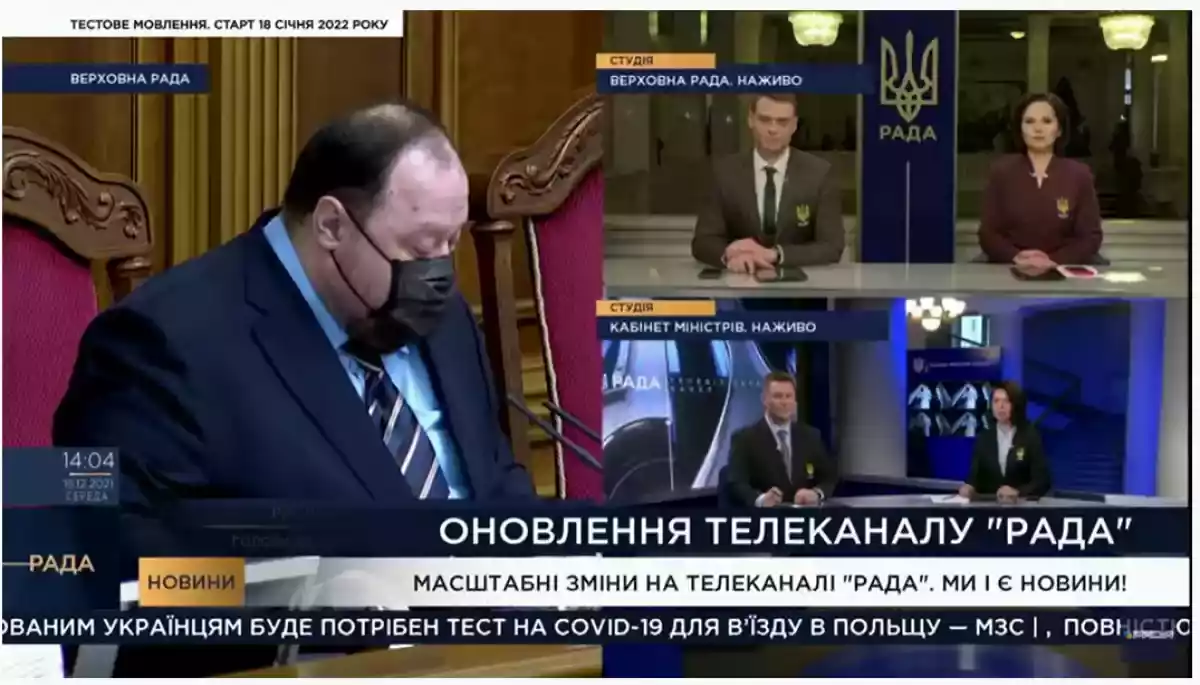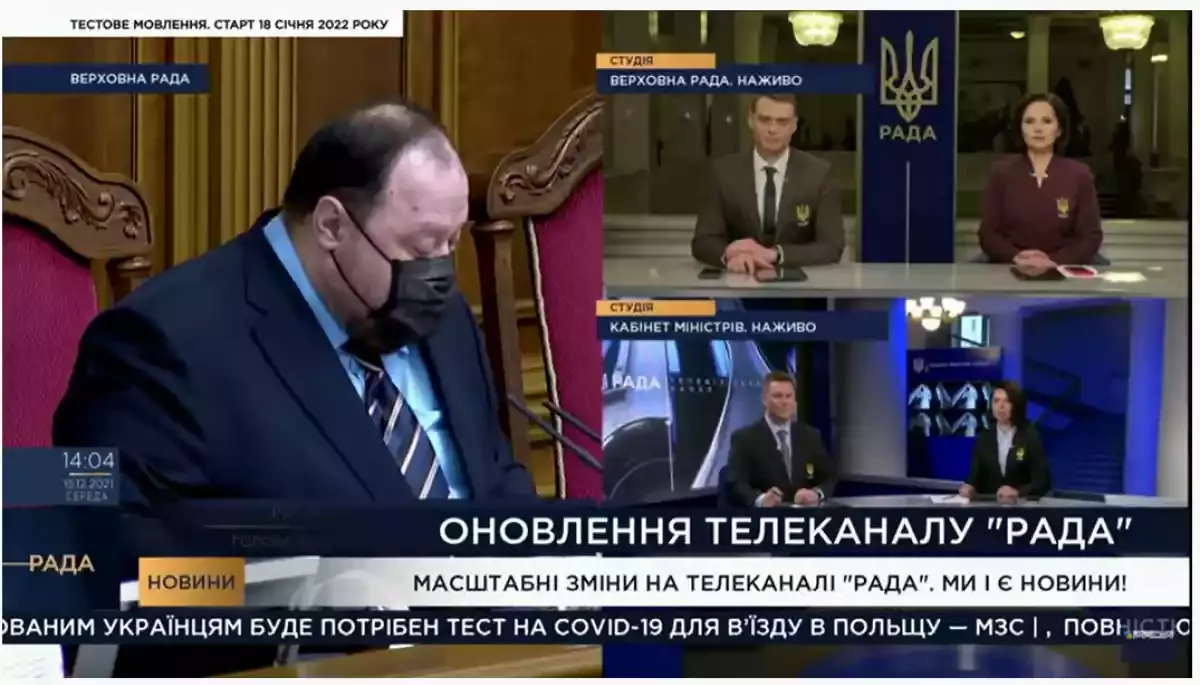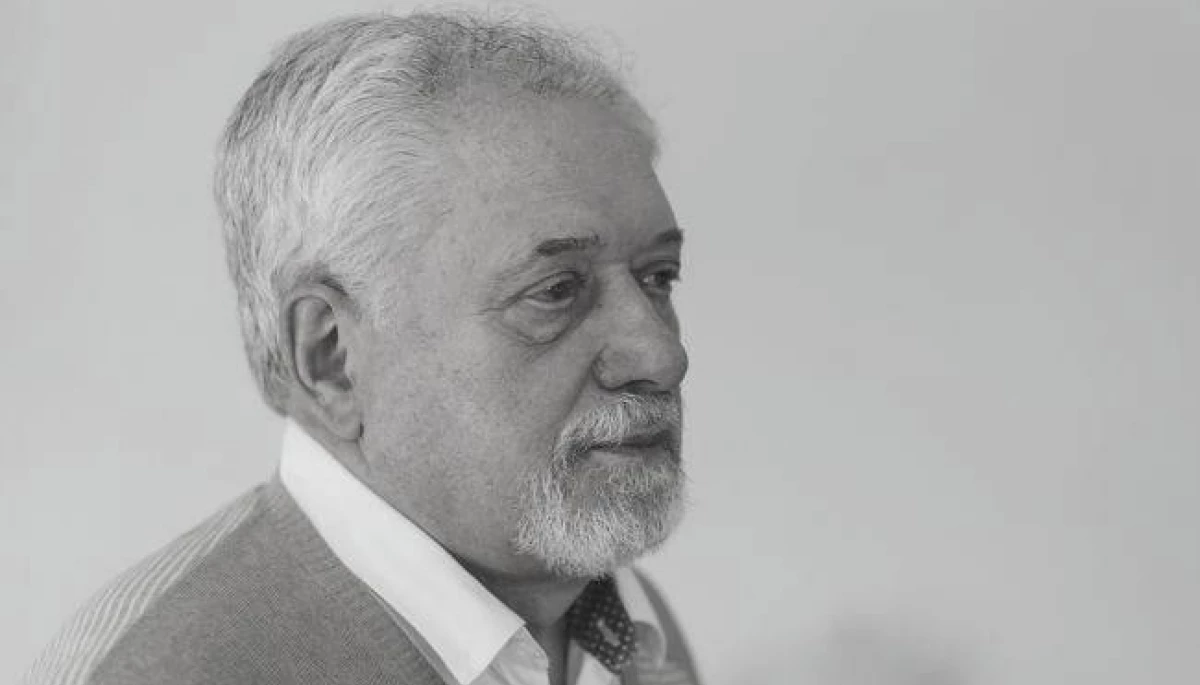
Authorities are the news themselves. How the "Servant of the People" is turning Rada TV channel into an instrument of PR and political struggle
Authorities are the news themselves. How the "Servant of the People" is turning Rada TV channel into an instrument of PR and political struggle


Українською читайте тут.
The renewed Rada channel was launched on December 15th. It has opened several studios, one in the Cabinet of Ministers and one in the lobby of Verkhovna Rada. Note on the screen, saying “Test mode broadcasting. Full start is scheduled for January 18th, 2022” indicates that the changes in the parliamentary TV channel are not final yet. Yet, even the promo, which appeared on the eve of the restart of the channel, is enough to understand the direction and content of these changes.
After the relaunch video was mentioned in the parliament (journalists posted it on social media the day before), and the opposition demanded that it be shown in the session hall, the Rada (here and after meaning the “channel”) officially disowned him. Rada said that the channel has nothing to do with the video and is not responsible for its content. "Our staff did not conduct or approve this video. This video will not be aired on our TV channel", the statement reads. Most probably, the channel employees actually have nothing to do with it because the channel itself now represents only the owner of the license and the recipient of money from the budget, which will be paid to a private production filming most of the content. However, that same video features presenters who already work on the Rada channel. The video was shot in Verkhovna Rada, which obviously required high-level permission. In addition, there are already introductory videos broadcasted on air with the channel's key “face” figures created in the same style. These are obviously clips from the same shooting.
Let's take a closer look at this video.
“When the opposition found out that the Rada channel will be updated,” the video’s behind the scenes voice says, “and it will be a quality channel, in all their controlled media, they (the opposition leaders) started hysteria that the channel will work for the government.” Here is what we want to tell you. The Rada channel was and is a state channel. We have been and will continue covering what is happening in the government and political power. We will inform Ukrainians about news and government events. Of this current power. Of the one that will be after this one. And the one that will be after that. This is our job - to inform those who have elected this government about the work of this government. Just as presenters and journalists of other channels are frantically defending the interests of their wealthy owners, we will protect the interests of Ukraine. This is how we differ from them. Glory to Ukraine.”
Several key messages are coded in this small manifesto.
Firstly, through the authors of the video, the authorities practically acknowledge that the relaunch of the Rada is a part of the political-technological media war waged by Volodymyr Zelenskyi and his office against other politicians (opposition) and oligarchs. From the very first day of the broadcast, it became clear that “opposition” primarily is the “European Solidarity” party. Specifically, this faction is the only one to loudly draw attention to the state broadcaster's situation. Instead, representatives of the “Opposition Platform - For Life” speak positively about the changes on the Rada channel. Vice-Speaker Olena Kondratyuk (from “Batkivshchyna” party) promised to closely monitor the balanced coverage of the parliament's work on the Rada channel and the compliance of its work with the law.
Secondly, we have an official renaissance of the state media’s idea - the one that serves the state, spreads primarily the state's position, and which is created and exists to serve the information needs of the government. Yet, the taxpayers finance this (Detector Media spoke in detail about the budget expenditures on the state media in 2021 and 2022). Earlier, the state's need for “its own voice” was justified by the need to resist Russian propaganda. However, this is no longer mentioned, and the main distributors of Russian propaganda – “OPZZH party” - support the strengthening of the state media or, at least, do not criticize it (as was the case with the “House” (Дом) channel). You have probably noticed the manipulation in wording “interests of the government = interests of Ukraine.”
In fact, the strengthening of the state media is a counter-revolution in the information sphere, which directly contradicts Ukraine's international obligations. A 2005 report by the Council of Europe (Missions of Anna Severinsen and Renate Wohlwend) said: “We call on the authorities to continue the process of eliminating state-owned media, as the existence of state-owned media is contrary to the European standards.” Moreover, reforms in this area after the Revolution of Dignity were aimed at eliminating state media ownership - the privatization of the press and the transformation of the National Television and Radio Companies of Ukraine, regional state television, and radio companies into public ones. Deviation from this course, changes in legislation that contradict democratic norms may negatively affect the prospects of European integration of our country.
Thirdly, other factions that may be concerned about the relaunch of the Rada under the control of the “Servant of the People” are being sent a signal: if you become the government in the future, all this will work for you. At the same time, Oleksandr Kornienko, First Vice-Speaker and Representative of the “Servant of the People” party said that the Rada would cover important events of the Cabinet of Ministers and the President's Office. That is, it will work for the team of Volodymyr Zelenskyi in complex. Although the mandatory tasks of the parliamentary TV channel, provided by law, should concern only the coverage of the work of the parliament itself (this does not mean that it cannot cover other topics), but not other governmental bodies. Thus, even in the case of proportional representation of factions on the air, there will be no balance between the government and the opposition on the Rada channel (because there is no opposition in either the Cabinet or the President's Office).
However, here it is not really about balance. Vadym Perenchuk, director of the Rada channel, told Detector Media: “We were checked by the Accounting Chamber and offered to prescribe a clearer formula of proportionality on the air. It depends on the number of faction members. For example, if the Servant of the People is the largest faction, it seems to me that they objectively have the right to be more present. In addition to this criterion, there is an information component. If a person registers an important bill, we will not tell him: “Your turn will be in a month because you are a non-partisan MP.” There is always a balance in our editorial policy.” However, it is unlikely that Vadym Perenchuk will determine the actual editorial policy. Now, he does not give the impression of a person who at least somehow influences the course of change in the broadcasting of the channel.
Oleksandr Kornienko mentioned an “independent editorial board” that supposedly would control the editorial policy. It is known that such council is consists of ten people: the director, his deputy, the editor-in-chief, the deputy editor-in-chief, one journalist, as well as five members of the Verkhovna Rada. Given that a third-party production will produce almost the entire product on the channel and it is a live broadcast product, such a council can react to events on the air only post-facto.
Other “servants” (“Servant of the People” party members represented in Verkhovna Rada) directly say that the majority, as the largest faction, has the right to be represented on the air more than others. In particular, Deputy Chairman of the Committee on Humanitarian and Information Policy Yevhenia Kravchuk said this during the broadcast on Channel 24. The slogan “We are the news!”, with which the Rada channel was relaunched, acquires a specific sound now.
We will see how strong the imbalance will be, whether it will be only quantitative or at the level of guest selection, the content of questions, and moderation, as is often the case in political talk shows. So far, the channel's hosts emphasize pluralism and the presence of opposition representatives on air. Before the relaunch, the Rada was not, at least, clearly biased in favor of the authorities. All factions and willing deputies had the opportunity to speak; no one tried to manipulate the editorial policy of the abandoned channel, probably simply because it did not give the impression of an effective platform for PR and promotion. The relaunch of the Rada seems to have been a spontaneous decision, finally taken recently. Back in September, Vadym Perenchuk discussed different options for developing the channel in an interview with Detector Media. He said “we are following an evolutionary path” and called the announcement of a tender for third-party companies to cover parliamentary work “the worst option.” Yet, this is how the channel decided to proceed: instead of developing its structure, it directed the money received from the budget to a third-party production.
On the first day of the broadcast, the updated Rada channel talked a lot about itself - announcing and praising its restart (“the most important event today”), responding to criticism (in particular, the hosts declared the channel as “objective”), asked the guests on air to comment on critical remarks of MPs, in particular, the speech by Iryna Herashchenko. Her speech was ended after mentioning that the channel was run by a man who ran Medvedchuk's channels (Oleksiy Semenov). Another Medvedchuk's ally, chairman of the Verkhovna Rada Committee on Freedom of Speech and owner of the First Independent / Ukrlive - Nestor Shufrych, took the floor to remind the MP from Petro Poroshenko’s party, that this same man launched the Pryamyi channel (Прямий) as well.
Was Shufrych's speech in defense of the relaunched Rada channel - and then the welcoming and loyal comment of the People's Deputy from OPZZ Valeryi Hnatenko on the channel's rebirth - a coincidence? Perhaps this could be somehow explained by the quiet return of Shufrych's channel to the satellite television after nine months of blocking. Or, this could as well as be due to the apparent easing of OPZZH’s public relations and the return of People's Deputies from the “Servant of the People” on the First Independent channel’s broadcast?
It is possible to explain, if not justify, the presence of Oleksiy Semenov - a very well-known brand manager of information channels in Ukraine in this mysterious production (no one still knows its name or to whom it belongs) which produces content for the Rada channel. In principle, the choice in favor of former employees of Medvedchuk's channels is also clear; they are well acquainted with the specifics of the work of information channels, and there are no particularly odious ones among those hired to the Rada. The presenter, who was going by Anastasia Medvedchuk on “112 Channel”, here on the Rada already appears as Krasnytska (and, it seems, she has nothing to do with Medvedchuk). Natalia Yastrubenko, editor-in-chief of the anonymous production, was also not involved in the scandals. Among the presenters are also Yehor Skoryna, who has just resigned from the “24” news channel, and Anna Homonai - a former host of “Inter,” who returned to the television after a long break.
The situation is more complex for Volodymyr Petrov, a political technologist and the founder of the Iceland channel, who will host the op-ed program on the channel. Detector Media is preparing a detailed dossier of Petrov, as his track record dates back to the mid-2000s when he was known as Lumpen. Petrov is a political technologist and shareholder: he develops discrediting campaigns and implements them himself. One of his provocative doings was remembered by the fact that during it, Vadym Titushko attacked Olha Snitsarchuk and Vlada Sodel. There were many others up to the 2018 Tinder scandal, after which Petrov was granted a suspicion note.
He ran in the 2019 presidential election, but he did not excel apart from a few vague manifestations such as advertising in Italy. During Zelenskyi's presidency, Petrov, according to many Detector Media sources, worked informally with the President's Office. However, Iceland did not appear to be a hotbed of manipulation and public relations; instead, it appeared as a television for the soul. The latest scandal in which he was involved is related to the threats against the owners of the “Bukvy” site. Because of specifically Petrov's words Bukvy had the reason to talk about a "raider seize attempt" by the authorities.
Involving Petrov as the host of the op-ed program and his colleague from the “Iceland” channel, Serhiy Ivanov, a former co-host of “Right to Power” TV program on “1+1”, who on the first day of broadcasting worked as a host of the guest studio – is a sign that the real task of the Rada goes beyond the coverage of parliamentary work and even the positive PR of the government. Such high-level black PR and reputation-destroying specialists are not going to simply talk about legislative initiatives and interview the deputies in the studio. The Rada is preparing for war.
So far, this is the preparation, not war. With the Cabinet of Ministers adding only 15 instead of the expected 43 million to the Rada’s budget this year, the channel is running in the format of a tele-marathon and guest studios, and the promised to the public more complex talk shows will air later. As of now, it is a usual information channel - there are at least a dozen of them in Ukraine, and a dozen more are on the way - with numerous technical overlays, for which the hosts apologize and promise to be the best. Representatives of all factions appear on air, except for the European Solidarity, which is actively opposed to changes in the channel. In particular, the party is preparing parliamentary inquiries and asked a number of questions during the meeting with the Speaker of the Verkhovna Rada Ruslan Stefanchuk, most of which he was unable to answer.
But even if opposition politicians decide to boycott the renewed Rada, as previously announced by the European solidarity to boycott 1 + 1, it is unlikely to be massive, and other factions will probably not join it. For MPs, the parliamentary TV channel is an opportunity to be public (roughly speaking - to publicize themselves, raise awareness of their own persona and their faction/party) without leaving the Verkhovna Rada building. In this regard, the private TV channels - except for party ones, which promote the parties of their owners - are not very generous in PR-ing “not their own.” After all, if you have already paid for parliamentary television from the budget, why not use it?
Especially if the picture is clear and the studio is beautifully decorated, and not as it was before. The main argument of the “servants” and bloggers related to them in defense of Rada’s relaunch is that the channel, which was never updated and looked like the television of the '90s, is finally being modernized. From their point of view, finally, someone has to do something with the parliamentary television. Well, that is true. Such an update, the “glamorization” of state or municipal resources, which are planned to make effective PR tools, has happened more than once in the history of Ukrainian media. We can mention Kazbek Bektursunov’s and Dmytro Dzhangirov’s “Kyiv Media Holding,” which provided media support to the former Kyiv mayor Leonid Chernovetsky. Or the period in the history of the National Television Company of Ukraine, when it was headed by Yehor Benkendorf, and the channel became closer to the “Inter” media group. Finally, the launch of the Dom TV channel for the reintegration of the occupied territories, which, contrary to the statutory status of foreign broadcasting, is now being transformed into a national socio-political Russian-language TV channel with Palchevskyi and the “Let's Imprison” program. In the first two cases, the government's motives, which attracted “innovators” and gave them a lot of money from the budget, can hardly be considered altruistic: it was about stricter control, public relations, political struggle, influence on public opinion. As for the third, so far, we can only make the same assumption — the process is still ongoing.
Babel dived into Prozorro procurement and found out which companies receive money from the Rada. The channel will pay 9 million hryvnias to the company called “Kinokit,” which will develop its creative concept and create a cycle of analytical and information programs. Babel named Kinokit company as one of the contractors in the “Ukraine 30” forum, which was organized by the company owned by the head of the President's Office, Kyryl Tymoshenko. Interestingly, the ex-founder of the company is a documentary filmmaker Volodymyr Oseledchyk, former executive and general producer of 1 + 1. The director of Kinokit, Serhiy Samoilenko, refused to answer Babel’s question, saying it is a commercial secret. Another big order - for 6 million hryvnias -will be given out to a private entrepreneur Daria Litvinova, who will create the decorations and elements of design.
DM managed to find out that the Rada channel's production was launched on the basis of Kinokit.
A lawyer from the Institute of Mass Information, Ali Safarov, says that under the law Rada TV channel has no special status. “The fact that the Verkhovna Rada apparatus founded it does not change its legal regulation: it remains under the law "On Television and Radio Broadcasting" and must operate within the licenses issued by the National Council on Television and Radio Broadcasting. According to the data of the National Council on Television and Radio Broadcasting, the Rada channel has a satellite license with a total broadcasting capacity of 14 hours per day and a digital broadcasting license with a total volume of 24 hours per day. At the same time, the Rada channel is included in the universal program service (UPS) under a satellite license, which lasts from 8 am to 10 pm and has a total broadcasting volume of 14 hours. According to it, all 14 hours should be produced not by outsourcing mechanisms but by the channel itself. Therefore, there are a few issues with the channel and its future reformatting, involving external contractors for content production. If Verkhovna Rada will try to create a structure for the channel and return it to the legal terms - I can only welcome it, but we have doubts that this is exactly what will happen,” the lawyer said. According to him, Verkhovna Rada should pass a law justifying the changes in Rada’s broadcasting: changes to the statute and program concept in the National Council on Television and Radio Broadcasting alone are not enough. According to Ali Safarov, to make everything being announced on the channel not contradict the law, it is necessary to amend the law “On Television and Radio Broadcasting,” defining the special legal status of Rada itself. “Otherwise, it will simply not be possible to legally implement the announced things, at the very least - cooperation with production studios. The inclusion of the channel in the UPS happened based on a satellite license, and it does not provide for the purchase of someone else's product,” he explains.
“The channel is a state-owned enterprise, which must publish a lot of information on the website, but it is not there,” said the lawyer from IMI (Institute of Mass Information). — All of this creates the need to bring the activities of the Rada channel to the legal level. But for now, it seems that the legal field is going to be somehow rewritten for the Rada channel purposes instead.” According to him, despite the legality of allocating additional money to Rada, society has the right to know exactly how this money will be spent, and most importantly — if there is a public need for it. Read a more detailed analysis of the legal status of the parliamentary TV channel by IMI here.
Regarding the idea of “proportional” representation of factions on the channel's broadcast, Ali Safarov says that this principle should be enshrined in Rada’s statute and perhaps even in the national legislation. He also adds that the registration of the channel not as a subdivision of Verkhovna Rada but as a separate state TV channel violates Ukraine's commitment to renounce the state ownership of the media: “In fact, this is a step backward.”
Detector Media has addressed Verkhovna Rada Apparatus with questions about the winners of Rada's creative contests, the name and owners of the production company (or companies?) that produce the content for the channel, asked about the circumstances of the video shooting with the channel’s presenters, which the channel has later disowned.













